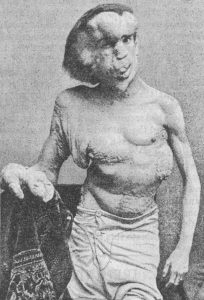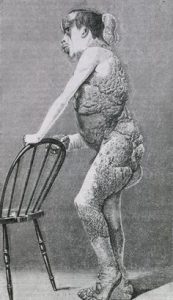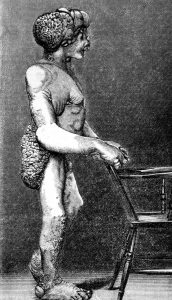Tom Marsh undertaking challenging role of ‘Elephant Man’ Joe Merrick
 Local actor Tom Marsh is undertaking his most challenging role to date. He’ll be portraying Joseph Merrick in Theatre Conspiracy’s upcoming production of Bernard Pomerance’s The Elephant Man. Rick Sebastian directs, with Scott Carpenter, Joann Haley, Stephen Hooper, Rob Green, David Pimentel, Anna Grilli and Scott Thomson rounding out the cast.
Local actor Tom Marsh is undertaking his most challenging role to date. He’ll be portraying Joseph Merrick in Theatre Conspiracy’s upcoming production of Bernard Pomerance’s The Elephant Man. Rick Sebastian directs, with Scott Carpenter, Joann Haley, Stephen Hooper, Rob Green, David Pimentel, Anna Grilli and Scott Thomson rounding out the cast.
The play could not be more timely, as it underscores the pitfalls of judging people on their outward appearance and the emotional damage inflicted on people who don’t measure up to our Hollywood-Madison-Avenue-imposed concept of beauty, ability and intelligence.
It’s no secret that slim, good-looking men and women have a decided advantage over more-qualified  but less attractive candidates when it comes to job applications, promotions and political office. Shaming people over their weight or appearance is commonplace.
but less attractive candidates when it comes to job applications, promotions and political office. Shaming people over their weight or appearance is commonplace.
We would all like to believe that we’ve evolved in temperament and tolerance over the past 100 years, when opponents of women’s suffrage reviled suffragettes as snaggle-tooth hags too ugly to land husbands. But after the women’s march on the day after President Trump’s inauguration in 2016, one federal judge posted on Facebook that “after just one day in office, Trump managed to achieve something that no one else has been able to do:  he got a million fat women out walking,” with a Nebraska state senator retweeting an image of three participants holding signs that objected to the President’s Accent Hollywood remarks along with the words, “Ladies, I think you’re safe.”
he got a million fat women out walking,” with a Nebraska state senator retweeting an image of three participants holding signs that objected to the President’s Accent Hollywood remarks along with the words, “Ladies, I think you’re safe.”
For many, attacking someone’s looks is an almost instinctual response when they disagree with his or her position or point of view. To be completely candid, all but the most enlightened among us feel discomfort when we encounter someone who’s disabled, physically impaired or visibly deformed. How many of us even make eye contact when we meet a disabled individual on the street or some public venue?
But even by today’s  standards and sensibilities, Joseph Carey Merrick was an extreme case.
standards and sensibilities, Joseph Carey Merrick was an extreme case.
Although the boy appeared normal at birth, by the time he celebrated his fifth birthday, he’d already developed patches of lumpy, grayish skin, which his parents attributed to his mother having been frightened by a stampeding elephant during her pregnancy. As Merrick grew older, he developed more severe deformities, until head and body were covered with various bony and fleshy tumors. Yet despite these infirmities, Merrick had a relatively normal childhood and attended the local school. But then his mom died of bronchial pneumonia when he was 11, his father remarried, and he was forced to fend for himself.
Because  his appearance frightened people and his deformities prevented him from using his hands to do manual labor, he ended up in a workhouse by the time he was 17. It was a brutal, degrading existence, and led Merrick in 1884 to profit from his deformities and thereby escape life in the workhouse. So he contacted the proprietor of a nearby music hall by the name of Sam Torr, and together they devised a plan to get him into a human oddities show.
his appearance frightened people and his deformities prevented him from using his hands to do manual labor, he ended up in a workhouse by the time he was 17. It was a brutal, degrading existence, and led Merrick in 1884 to profit from his deformities and thereby escape life in the workhouse. So he contacted the proprietor of a nearby music hall by the name of Sam Torr, and together they devised a plan to get him into a human oddities show.
“Human curiosities, or lusus naturae—freaks of nature—were among the most popular traveling entertainments of the late eighteenth and early nineteenth centuries,” explains Emory University Professor and English Chair Benjamin Reiss in his book The Showman and The Slave, which talks about P.T. Barnum, who was featured recently in the film The Greatest Showman. But by the time  Merrick became The Elephant Man – half human and half elephant – many people and groups were already deriding populist carnivalesque entertainment as “an offense to genteel sensibilities.”
Merrick became The Elephant Man – half human and half elephant – many people and groups were already deriding populist carnivalesque entertainment as “an offense to genteel sensibilities.”
How Merrick’s story evolves from there is the subject of the playwright and his play. But clearly, the part of The Elephant Man will prove challenging for Marsh, who will be required to evoke both horror and sympathy to make the play’s point that acts of kindness and compassion can elevate a person from a life of degradation and victimization to one of dignity and safety. The role is as physically taxing as it is mentally and emotionally demanding, requiring exaggerated physical movements, labored breathing and distorted but understandable vocalization. Not to mention, tackling the role will invite comparisons  (even if unconscious) to Bradley Cooper, the latest Broadway actor to tackle the role.
(even if unconscious) to Bradley Cooper, the latest Broadway actor to tackle the role.
Marsh has been growing and developing as an actor for several years now, and he will be ably assisted by a good director in the form of Rick Sebastian. It will be interesting to see how both handle the part.
The Elephant Man opens in the Foulds Theatre at the Alliance for the Arts for a two-week run on November 8.
October 26, 2018.














 Tom Hall is both an amateur artist and aspiring novelist who writes art quest thrillers. He is in the final stages of completing his debut novel titled "Art Detective," a story that fictionalizes the discovery of the fabled billion-dollar Impressionist collection of Parisian art dealer Josse Bernheim-Jeune, thought by many to have perished during World War II when the collection's hiding place, Castle de Rastignac in southern France, was destroyed by the Wehrmacht in reprisal for attacks made by members of the Resistance operating in the area. A former tax attorney, Tom holds a bachelor's degree as well as both a juris doctorate and masters of laws in taxation from the University of Florida. Tom lives in Estero, Florida with his fiancee, Connie, and their four cats.
Tom Hall is both an amateur artist and aspiring novelist who writes art quest thrillers. He is in the final stages of completing his debut novel titled "Art Detective," a story that fictionalizes the discovery of the fabled billion-dollar Impressionist collection of Parisian art dealer Josse Bernheim-Jeune, thought by many to have perished during World War II when the collection's hiding place, Castle de Rastignac in southern France, was destroyed by the Wehrmacht in reprisal for attacks made by members of the Resistance operating in the area. A former tax attorney, Tom holds a bachelor's degree as well as both a juris doctorate and masters of laws in taxation from the University of Florida. Tom lives in Estero, Florida with his fiancee, Connie, and their four cats.